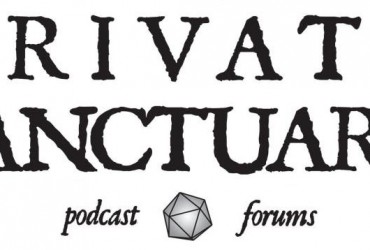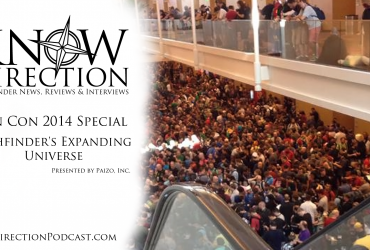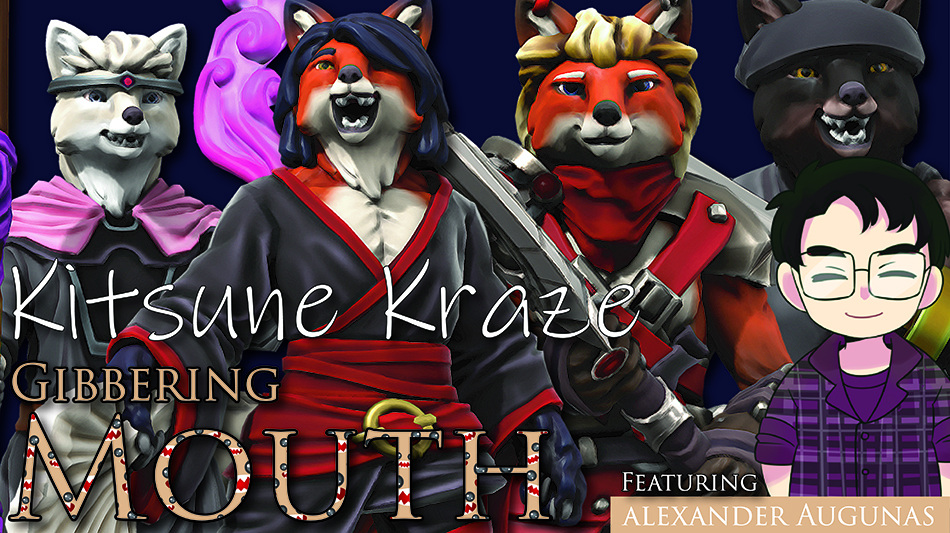Welcome to Guidance, Private Sanctuary’s source for tips and techniques for the Pathfinder Roleplaying Game, written by Everyman Gamer Alexander Augunas. Today, we’re going to be talking about the upcoming Pathfinder Unchained book and what it could mean for the rogue class.
At PaizoCon this year, Paizo Publishing announced its Spring 2015 hardcover–Pathfinder Unchained. There’s a product page (and a rather seething thread, if I do say so myself) up on Paizo’s website if you want to check it out. The purpose of Pathfinder Unchained is to go back and present alternate rules for the Pathfinder Roleplaying Game. It has been compared to Dungeons & Dragon’s Unearthed Arcana books, asking us the question: “What could the Pathfinder Roleplaying Game look like if we didn’t strive to maintain Backwards Compatibility?”
Since its Harrow Month, I thought it might be fun to think about this subject a little, specifically about the Rogue class. The rogue has always been a class under fire, with gamers questioning its value left and right. People love to point out about how other classes do the rogue’s job better than it, and in some cases (like the vivisectionist alchemist), they’re not too far from the truth.
But before we get started….
I do not work for Paizo Publishing. I do not know what will be in Pathfinder Unchained. If I did know, you can bet that I wouldn’t risk future freelancing opportunities with them writing this blog about what I knew on the website of a popular podcast.
And with that out of the way, let’s begin.
Problems with the Rogue
So, when people complain about the rogue, what are they referring to? In my rogue DPR analysis from way back when, we definitely discovered that the rogue lags behind the fighter and the paladin not in theoretical damage, but in practical damage. As a refresher, theoretical damage is what the rogue could do if it hits with its attacks while practical damage is how much damage the rogue will do in practice based on the probability of the rogue hitting his target. I also mentioned as a silver lining, however, that the rogue did achieve its goals of having more skill points than any other class.
That said, the rogue was actually somewhat nerfed in that regard.
From D&D to Pathfinder — Rogue Edition
Back in 3.5, there was no Favored Class mechanic. Instead, characters got quadruple skill points at 1st level and could place a number of ranks into a skill equal to the character’s level + 3. So the maximum number of ranks that a 1st level character could obtain would be 4, then 5 for a 2nd level character, 6 for a 3rd level character, and so on.
Now, the class skill mechanic existed in 3.5, but instead of offering an incentive to take certain skills because you got a bonus, it made skills that weren’t class skills for you more expensive to acquire. For example, if you were a fighter and wanted ranks in Knowledge (arcana), your fighter skill ranks were only worth half a rank towards that skill because Knowledge (arcana) isn’t a fighter class skill.
Now, in addition to having the best skill point progression in the game, rogues also had the largest number of class skills. At 1st level, a rogue would have a minimum of 32 skill ranks to spend (8 x 4 = 32) and those 32 skill ranks were almost always allocated to a class skill because there were a small number of skills that weren’t rogue skills. (Basically the same ones we have today.)
As a final benefit for the rogue, there were more skills in 3.5 then there are in Pathfinder. Perception was Search and Spot. Stealth was Hide and Move Silently. Acrobatics was Jump, Balance, and Tumble. And ALL of those skills were rogue class skills. Ultimately the merge and the loss of the fractional skill rank was a good thing (it made leveling up MUCH more complicated and limited character concepts), but those restrictions benefited the rogue. And when Pathfinder rolled around, the rogue lost a lot of its skill domination against other melee classes as a result.
Problems in Pathfinder
Now don’t get me wrong, Pathfinder gave a lot of love to the rogue, too. Rogues never had rogue talents before Pathfinder. But herein lies another problem—not with rogues themselves, but with Pathfinder’s evolving design philosophy. When the Core Rulebook was published, rogue talents were a new mechanic. The ability of having a list of powers that you could pick from wasn’t an entirely new concept, but it was the first time that such a system had been added to a core class. The clear balancing point was feats: rogue talents should be balanced like special, rogue-only feats. And so they were.
However, the Advanced Player’s Guide took the talent mechanic one step further with the alchemist, the oracle, and the witch. And for all three classes, discoveries, revelations, and hexes were undeniably more powerful than rogue talents. This isn’t a problem in the case of the witch or oracle, but the alchemist and the rogue share a good deal of overlap and if you look at the alchemist and the rogue, there are many similarities. Bombs and sneak attacks scale at about the same pace, for example. But in addition to having cool spells-by-another-name, the alchemist also has better “talents,” and this is a problem that we’ve continued to see with other, newer classes. When you get right down to it, rogue talents ARE the rogue’s class features. Other then that, all it has is trapfinding, sneak attack, evasion, uncanny dodge, trap sense, and improved uncanny dodge.
The final problem with rogues, as we’ve talked about in the Oh Rogues series, is the fact that rogues don’t really have anything that makes them unique. All of their class features can be accessed by other classes. So it stands to reason that many other classes can grab the rogue’s best tricks while still relying on their own abilities. It is a pretty big problem that has become increasingly apparent as the game has continued to evolve.
Looking into the Crystal Ball
Now again, I don’t work for Paizo and have no insight on what could be done in Pathfinder Unchained. Furthermore, its likely that I won’t be able to correctly predict what Paizo will do with anything in Pathfinder Unchained. (We’ve been in the Age of Lost Omens since 1917, after all. Prophecy HAS been dead for almost 100 years.) That said, I do feel comfortable enough to make some probably-incorrect-predictions.
- Skill Shuffling. I wouldn’t be surprised if we see a bit more skill shuffling to help the game even more. If Pathfinder was unchained from the current skill system, we could see a proficiency bonus like in 5E Dungeons and Dragons (a scaling bonus that is provided to all skills that you are ‘proficient’ in). That said, I don’t think that’s likely. I predict that Paizo is going to want to capitalize on what people like about Pathfinder, and that’s the flexibility of the system. I could see a few more skills getting merged together (I like the Athletics skill from 5E, for example) but ultimately I think we’re going to see a reassignment of the skill points per level system, as we did for Hit Dice back in 2007. Personally, I think that bumping it up to the same values as Hit Dice would make things easier (6 ranks/level for Fighters, 8 ranks/level for Druids, 10 ranks/level for Bards, 12 ranks/level for Rogues). Then again, that isn’t really a change that helps the rogue out much, so who knows?
- More class mechanics. I think we’re going to see more smaller mechanics added to the rogue, sort of like how there are a few levels where the alchemist gets poison resistance AND a discovery. Specifically, I think we’re going to see a mechanic that allows the rogue to gain some kind of bonus on attack rolls. Every other Medium BAB class in the game thus far has a way to boost its attack rolls (inspire courage, judgment, mutagen, arcane pool/arcane accuracy, etc.). The rogue needs some sort of numeric bonus in order to bring it up to where the other classes are at.
- Divorce from Allies. One of the most frustrating things about playing a rogue is how much you depend on your allies in order to be effective in combat. Other classes have ways to work together, but no other class is as reliant as the rogue as his allies. This includes the cavalier, which is the class build around teamwork feats. I wouldn’t be surprised if rogues had another way to trigger sneak attack damage as a result.
- Rogue Talent Power-Up. Finally, I think we’re going to see a power increase to the rogue’s talents. It was a great idea when it was conceived, but the progression of the game has made rogue talents wimpy compared to their equivalents in other classes.
And that’s all that the crystal ball that is my brain is providing me with on the Rogue Unchained today. What do you think? Do you agree with me? Disagree with me? Are you as skeptical as I am that anyone can guess what the design team is going to come up with? Care to try anyway? Leave your questions, comments, and concerns below and I’ll see you next time as Harrow Month continues!
Alexander “Alex” Augunas has been playing roleplaying games since 2007, which isn’t nearly as long as 90% of his colleagues. Alexander is an active freelancer for the Pathfinder Roleplaying Game and is best known as the author of the Pact Magic Unbound series by Radiance House. Alex is the owner of Everyman Gaming, LLC and is often stylized as the Everyman Gamer in honor of Guidance’s original home. Alex’s favorite color is blue, his favorite Pathfinder Race/Class combination is kitsune rogue, and hindsight is always 20-20 vision.







If Paizo wants the Rogue to continue with the role of *the* skill class, then the Rogue needs to have some built in ways to really get more out of skills than other classes. Like using Acrobatics ro run on water, or Sleight of Hand to ‘steal spells’ from casters, sense motive to read attackers and gain a bonus on attack/AC because he ‘predicts his movements’ or something.
Combat wise, if he got something like +1 to hit per sneak attack die while making a sneak attack, or even +1 per two dice, he’d probably be good.
One good thing they could do is draw from already existing feats for inspiration on buffing talents. Sap Adept/Master, Snake Style etc, any feat that makes more out of a skill, or makes Sneak Attack stronger would make for a great rogue talent buff.
Is dps really a useful measure for tabletop classes? Does it really matter to most people if they do 10% more or less damage than other people? I haven’t noticed that.
It’s more about how much spotlight does my character have. How often does he get to shine.
Unless you play in very combat heavy games, there’s lots of stuff happening outside of combat. It’s usually the rouge that has the social skills. It’s the rogue that sneaks around and scouts ahead. It’s the rogue that looks for traps and disarms them.
More often than not the rogue already is ahead of other classes and doesn’t really need anything more. I’d even go so far and say that because he’s so versatile outside of combat he should be weakened a bit in combat to get a better overall balance.
Balance is not (or at least should not) be about combat utility but spotlight so that every player has time to shine. The rogue gets his time outside combat and when he can set up sneak attacks. If you make the rogue the equal of a fighter in combat/dps, then you need to give the fighter 8 skill points and other out of combat mechanics to balance that.
“DPR” in a tabletop isn’t quite measured the same as it is in MMOs. People don’t generally look for percentages and theorycrafting isn’t as tight for, say, Pathfinder as it is for, say, World of Warcraft because there are a neigh infinite number of class options and abilities.
The rogue’s main problem comes from the fact that combat is designed to be the #1 challenge in a game. Skills are nice, but generally speaking skills aren’t very player involved. They’re “I make a check and something happens.” This is why most parties can get away with having one face character and one trap guy. For the most part, skill challenges don’t really need more than one character. To have something other then this, your GM needs to be very crafty and very involved in what your players are capable of doing. Combat is much more fluid as a result of this. Its why I’ve been saying since article #1 that combat is the heart and soul of the game.
So anyway, because you only really need one guy to be good at skills, those skill-oriented class are compared very harshly to one another. Alchemist to Bard to Investigator to Inquisitor to Rogue. And sadly, because only one of them is needed to be good at skills and skills don’t really have much of a strategy in building for them aside from “get the biggest bonus possible,” the classes usually fall back on their combat utility.
Of the four classes I mentioned, the rogue is the weakest both at skills and at combat. She’s got the damage, but she doesn’t have enough bonuses to hit compared to the others. Inquisitors have judgment. Alchemists have mutagen. Bards have inspire courage. Investigators have inspiration. The rogue …. doesn’t have anything like that. Furthermore, the other classes are better at skills than the rogue. The alchemist and investigator reward having a high Intelligence, so they end up having more skill points than the rogue. The inquisitor has a great array of spells and class features that boost her skills. The investigator has the entire inspiration mechanic and tons of talents to support it. The bard has bardic knowledge and versatile performance, which essentially gives her a 2-skills-for-one-point ability on three different skill. In comparison, the rogue’s talents are weak; scarcely at the same power level as a feat when discoveries and investigator talents are all often better than the feats they trade.
As the final nail in the coffin, the rogue has very few mechanics that are unique to her. TONS of prestige classes and archetypes (and now even hybrid classes) have sneak attack, trap finding, evasion, trap sense, trapfinding, and now, even rogue talents. The sad truth is that from combat to skills, the rogue doesn’t have much that makes her able to stand up to other classes and say, “This is what I bring to the table that you can’t do better.”
What Alex said above. Every single aspect of the Rogue has been given away to other players, hell, you can disable magical traps now for a single trait!
In previous editions, Rogue played a vital part in the party of ‘face guy’ and ‘skill monkey’. He was the only guy able to disable magical traps, and he was the only guy able to perfectly navigate all the social, political and skill aspects of the game. Sure, other classes could do bits and pieces of it well, but no one could do it like the Rogue could. In 3rd edition, the ability to disable magical traps was fairly rare (to my knowledge), so the Rogue’s role in a party was still very valuable. In Pathfinder, the the ability to disable magical traps is given out in tons of ways.
Do you know why this is? Because traps aren’t party friendly. If the only class in the game that can disable magical traps is the Rogue, then you absolutely *must* include the Rogue in the party, just for the sole purpose of disabling the traps.
For example, the party walks into the room and a magical, automatic resetting trap that fires Enervation is in the room. Back in 3rd edition, if you didn’t have a Rogue in the party, you guys were in serious crap as that trap is going to fire every round and none of you can stop it. In pathfinder, you can defeat it if you’re playing an Alchemist, or Bard, or Ranger, or Rogue, or Investigator, or Slayer (I believe), or if you have a certain trait.
Not only that, when it comes to traps and locks, the game grinds to a halt as a single character deals with it. When it comes to puzzles, the whole party can work on it. When it comes to combat, the whole party contributes. When it comes to social encounters, the whole party can be involved (though usually only one). But traps and locks? Nope, it’s a 1 man show.
When you play a trap heavy dungeon, you spend a lot of time with the *Skill Class* moving around, searching for traps, disabling traps, and picking locks. While the other 3 people stand by and do nothing. It’s kind of boring.
Paizo tried to move away from that so more people can be involved in more situations. The problem is, the Rogue was strictly a Skill Class with limited Combat Support. Since Pathfinder upgraded the skill potential of nearly every other class in the game, the Rogues focus of being a Skill class was vastly diminished.
Now his limited combat support became more vital to his play, but all the people who got upgraded skill potential, also got upgraded combat potential, while the Rogue got very little combat upgrades. His ‘special talents’ are most often used to grab as many feats as possible, because it’s honestly the best choice for him.
The sad fact is that, every single item the Rogue brought to the table is done better by someone else. Very probably, they can do the whole Rogue schtick better than the Rogue can. A Vivsectionist Alchemist with a trait can play a sneak, back stabbing guy who disables magical traps and acts as party face way better than the Rogue. An archeologist Bard is a far better face, and has enough skill points to to perform any skill he wishes to, and has enough magical buff support to carry himself, and his party through multiple fights. Rangers are just awesome. Slayers maybe can’t out skill a Rogue, but they can cover the essentials, and they can fight better too. Investigators just put the Rogue to shame when it comes to skills, and they also get a great combat buff that lets them outfit Rogues too.
The one thing, ONE THING, a Rogue still brings to the table that almost no one else can do, is the Scout archetype (Ninja’s can apparently grab it). So he can guarantee flat-footed attacks at a certain point, and if he goes the Sap Adept/Master route, he can dish out seriously competitive non-lethal damage. But just like with Sneak Attack, there are many creatures that he just can’t fight due to immunity to non-lethal damage.
I am really loving the theme/design of your site.
Do you ever run into any internet browser compatibility issues?
A couple of my blog audience have complained about my site not working correctly in Explorer but looks great
in Safari. Do you have any solutions to help fix this issue?
Thanks! The design of the site was all Perram’s doing. I just drew my banner to match his theme. If you have any questions about the site, head over to our Know Direction Facebook group and direct them to Jefferson Thacker (also known as Perram).
Your style is really unique compared to other folks I have read stuff from.
Thanks for posting when you’ve got the opportunity, Guess
I’ll just bookmark this blog.